How can parents die kids for support? Yeah get a lawyer they stole from you.
I Refuse to Support Parents Who Never Cared for Me — I Won’t Sacrifice Myself as Their Backup Plan
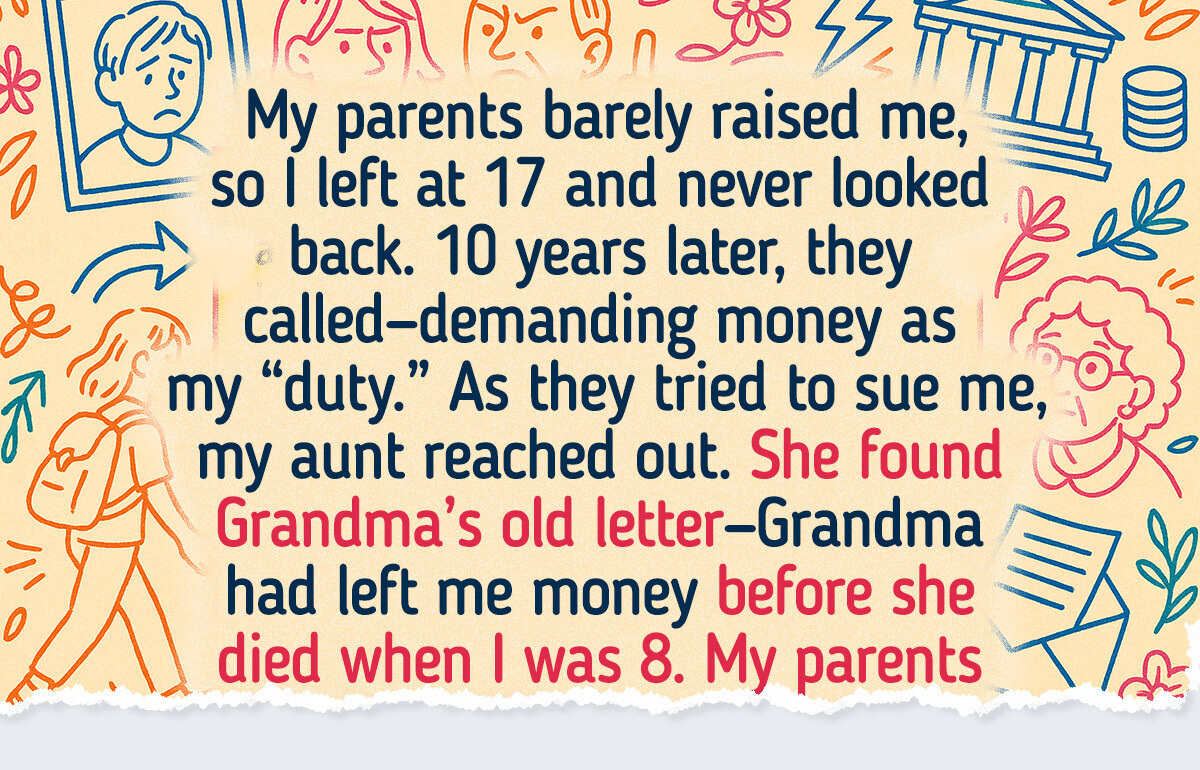
This story was shared with us by one of our readers. Growing up, she often felt overlooked and undervalued by her parents, who poured their time, money, and affection into her sibling instead. She learned to survive on her own, without the support most children expect from family.
Years later, the tables turned.
The letter:
Hi Bright Side team,
My parents never raised me—just fed me enough to survive. At 17, I left with no goodbye and never spoke to any of them again. Eight years later, they called for the first time: “You owe us now. Send $1,500 a month—it’s your duty.” I hung up. Days later, they tried to sue me for financial support.
While I built my defense, my aunt somehow reached me. She said, trembling, “I thought you knew... about your grandmother.” I didn’t. Turns out, Grandma left a large bank account in my name—no will, just a letter asking my aunt to protect it. But I vanished, and my aunt assumed I’d taken it and left.
Last month, she finally discovered the truth — my parents had hidden everything. They cashed out what my grandmother left for me and now have the nerve to ask for more. She even showed me a letter from my grandmother that I never received.
I didn’t call them. I sent them one photo: Grandma’s letter. No words, no reply. Let them sit with the ghost of the woman who loved me more than they ever did.

Financially Selfish Parents: The Hidden Burden
Financially selfish parents aren’t simply those who refuse to give their children money. They are the ones who live recklessly, make poor financial decisions, and expect their children to pay for those choices later. They call it love while spending, but it becomes an obligation when the bill arrives.
It’s not easy to say “no” to your kids. True love isn’t buying them everything — it’s teaching them how money works: how to earn it, manage it, invest it. All without turning them cold or greedy. Financial wisdom is not meant to make children ruthless; it’s meant to make them independent.
The problem with financially selfish parents is this:
They give endlessly while young... and then demand endlessly when old.
They don’t prepare for their own future, assuming their children are their retirement plan. And when adulthood arrives, it’s the child who pays — with money, time, or emotional burnout.
Red Flags of Financial Selfishness
No stability at home: Constant conflict or divorce without planning can leave children responsible for rebuilding chaos they didn’t cause.
No support network: Moving constantly, cutting family ties, or isolating can drain both financial and emotional resources.
Mental health ignored: When unresolved trauma or mental illness is passed down instead of treated, children inherit more than debt — they inherit emotional wounds.
Psychological tips to stay grounded & protect your boundaries.

It's unlikely that suing them will help you financially, BUT if a judgement IS ordered against them, depending on your location, it CAN prevent them from receiving any kind of assistance through social or governmental programs. I am sure that ignoring them is preferable, but I wish you could receive something from them. It is also possible that THEY DO have something worth suing for, and just want what is yours, without lifting a finger. You could check it out.
Build non-contingent self-worth
Don’t tie your value to how others treat you. Research on relationship-contingent self-esteem (RCSE) shows that people who base their self-worth on how their partner (or family) treats them experience stronger emotional ups and downs in response to relationship events.
Tip: Cultivate your self-worth through things independent of others — your values, skills, passions, and inner strengths. Remind yourself: I am worthy, even if I refuse demands that don’t serve me.
Spot entitlement early and name it
Entitlement in relationships often looks like “I deserve this” or “You owe me this” without real dialogue or fairness. According to Psychology Today, destructive entitlement can show up as guilt trips, demands, or justifications of unfair behavior.
Tip: When someone acts entitled, mentally label it (in your head or journal): “That demand felt like entitlement.” Naming it reduces its power and helps you respond (rather than react).
Set limits using “I” statements
The concept of entitlement schemas encourages self-reflection and communication without blame.
Tip: Use statements like “I feel overwhelmed when I’m asked to give beyond my means” or “I need time to think before committing.” This frames your boundary without escalating into conflict.
Practice emotional distancing (not coldness, just clarity)
When someone responds with guilt or anger to your boundaries, it often means they feel their expectations were threatened. Because RCSE makes people more reactive to negative relationship events, those with high RCSE may blow up when their sense of entitlement is challenged.
Tip: When faced with emotional pressure, pause. Breathe. Remind yourself: “Their reaction is about their expectations, not about my worth.” Don’t try to immediately justify or explain everything.
Surround yourself with validation outside that relationship
Because “reflected appraisal” is how we often internalize others’ views of us, negative treatment by a parent or partner can deeply wound our self-image.
Tip: Seek support from friends, mentors, and therapists. Their approval and encouragement can help you counterbalance toxic messages from unhealthy relationships.
Seek professional support to break patterns
Therapeutic approaches (like schema therapy) help uncover entitlement origins, rebuild empathy, and strengthen healthy boundaries.
Tip: If guilt, self-doubt, or family pressure feels overwhelming, a therapist can help you reprogram your emotional responses and maintain your integrity.
At the end of the day, family is about love, respect, and support — not about demands or entitlement. Learning to set boundaries doesn’t make you selfish; it makes you strong. And sometimes, the bravest thing you can do for yourself is simply to say: “No.”
20 People Who Proved That the Kindest Hearts Wear the Strongest Armor
Comments
Related Reads
My Parents Chose My Golden Child Brother Over Me—Until They Needed My Help
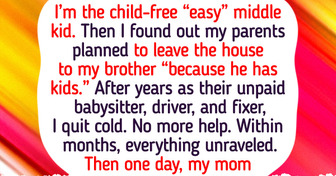
10 Dating Stories That Started Like Rom-Coms but Ended Like Horror Movies

My Sister Ruined My Child-Free Wedding—So I Served Her Cold Revenge
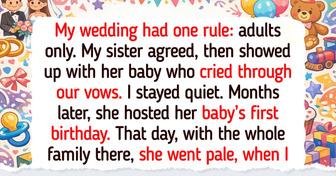
My MIL Ignored Our Rule and Bought My Son a Puppy, She Wasn’t Ready for My Surprise

12 Small Acts of Kindness That Quietly Changed Lives
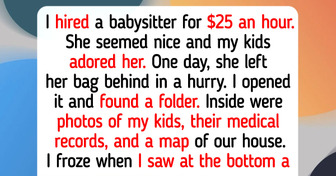
12 Times Kindness Ruled in the Office Like a Boss
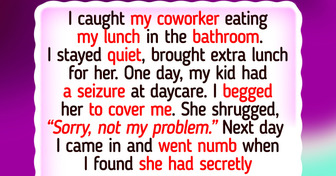
16 Tiny Acts From Strangers That Left Permanent Marks on People

15 Stories That Show Kindness Is a Quiet Language the World Needs
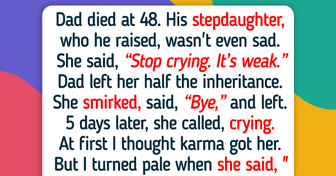
I Refused to Be Treated Like a Maid in My Own Home—So I Changed the Rules
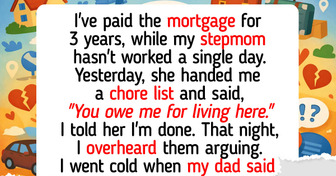
10 Hospital Workers Who Prove Kind Heart Is a Powerful Medicine

12 Stepparents Who Kept Showing Up Even When They Weren’t Wanted
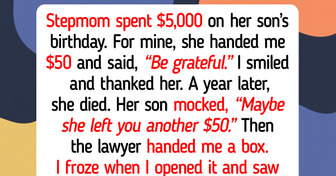
I Refuse to Give Up the Passenger Seat for My MIL—She Should Learn Her Place
